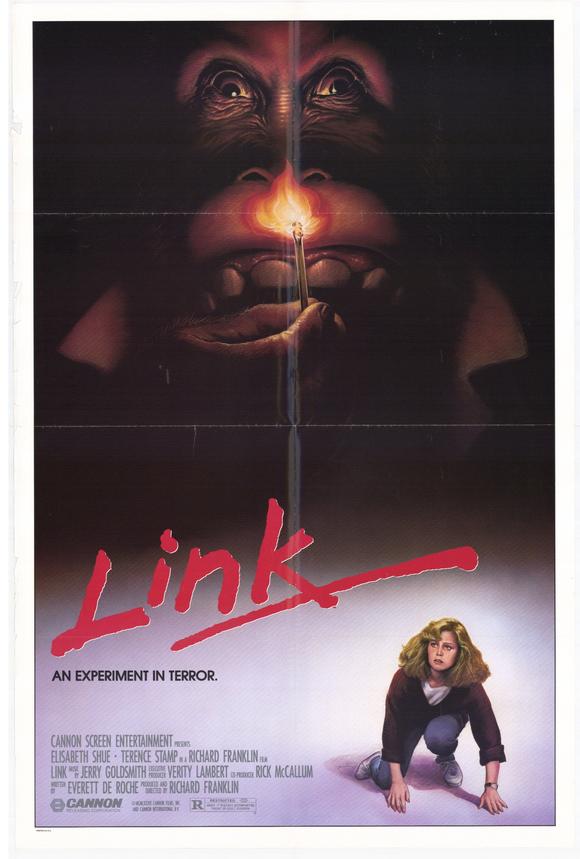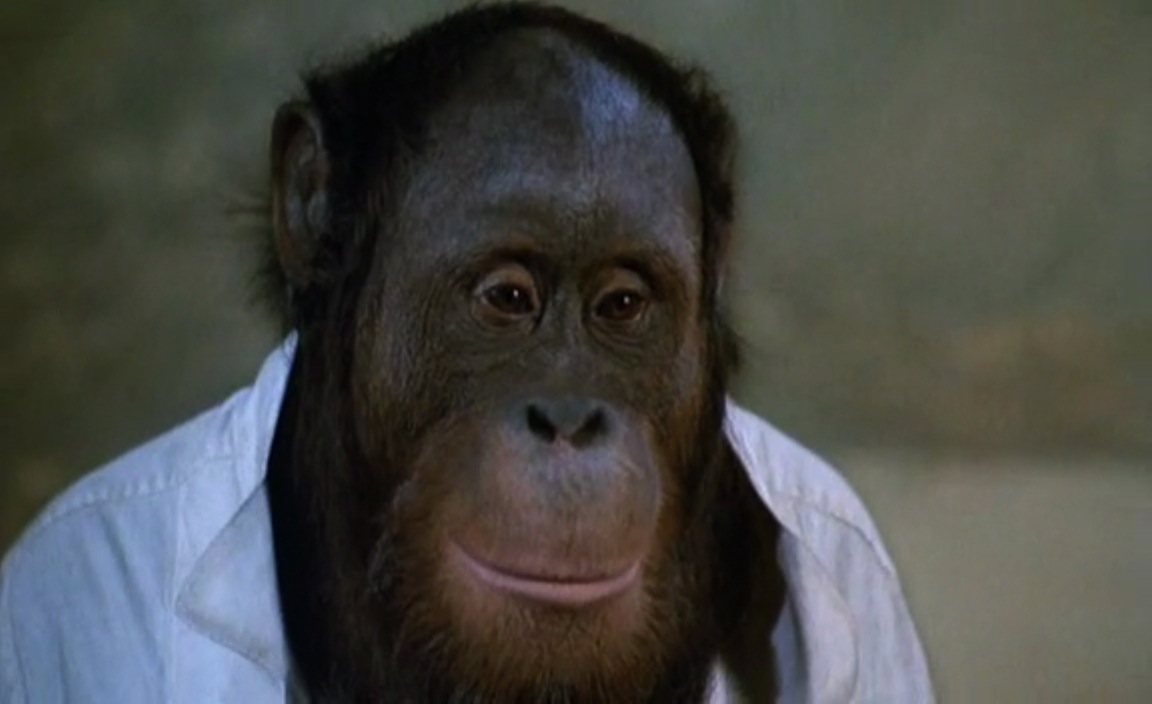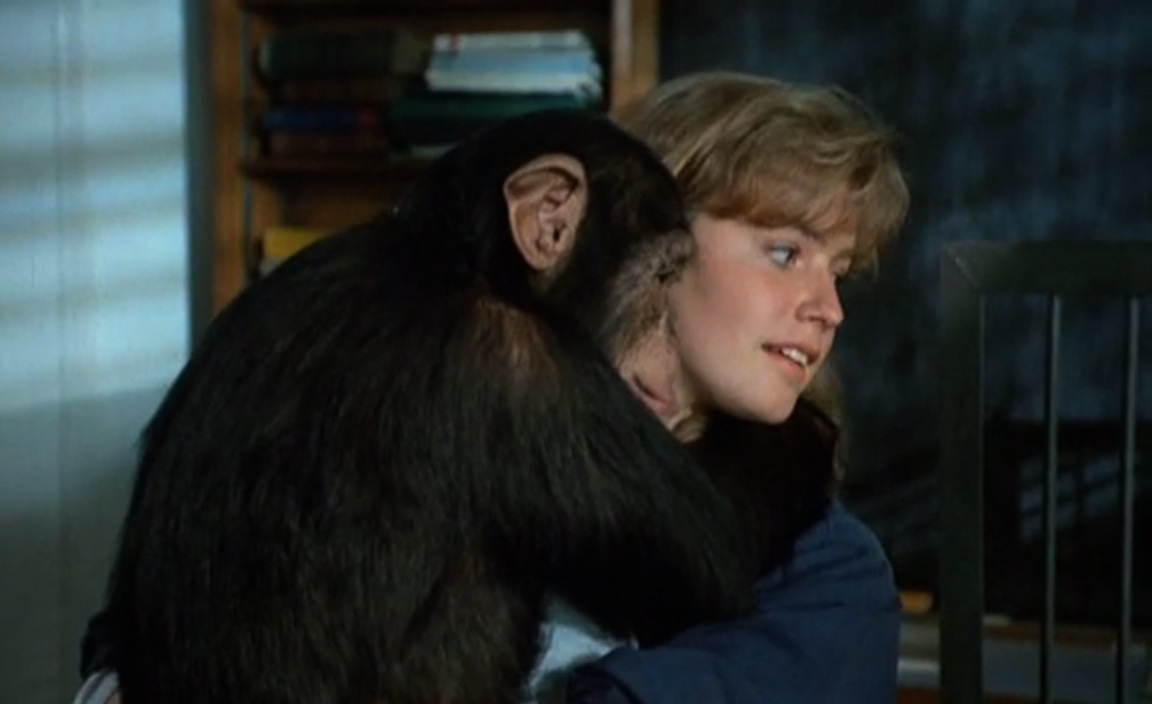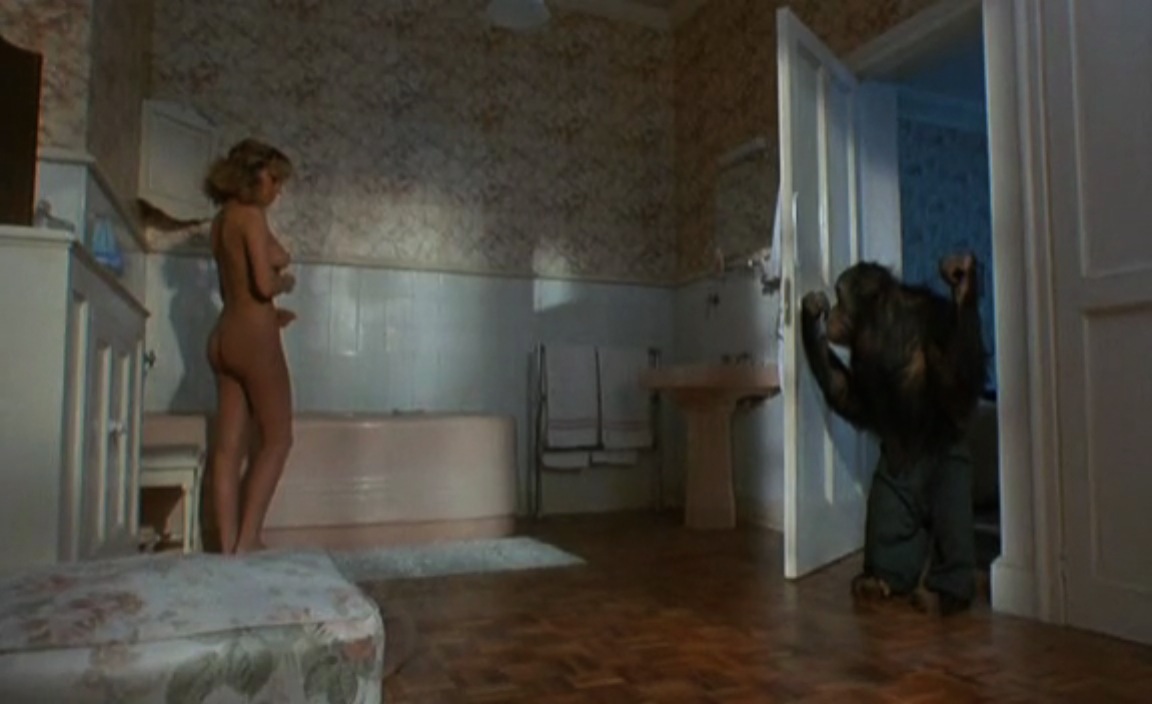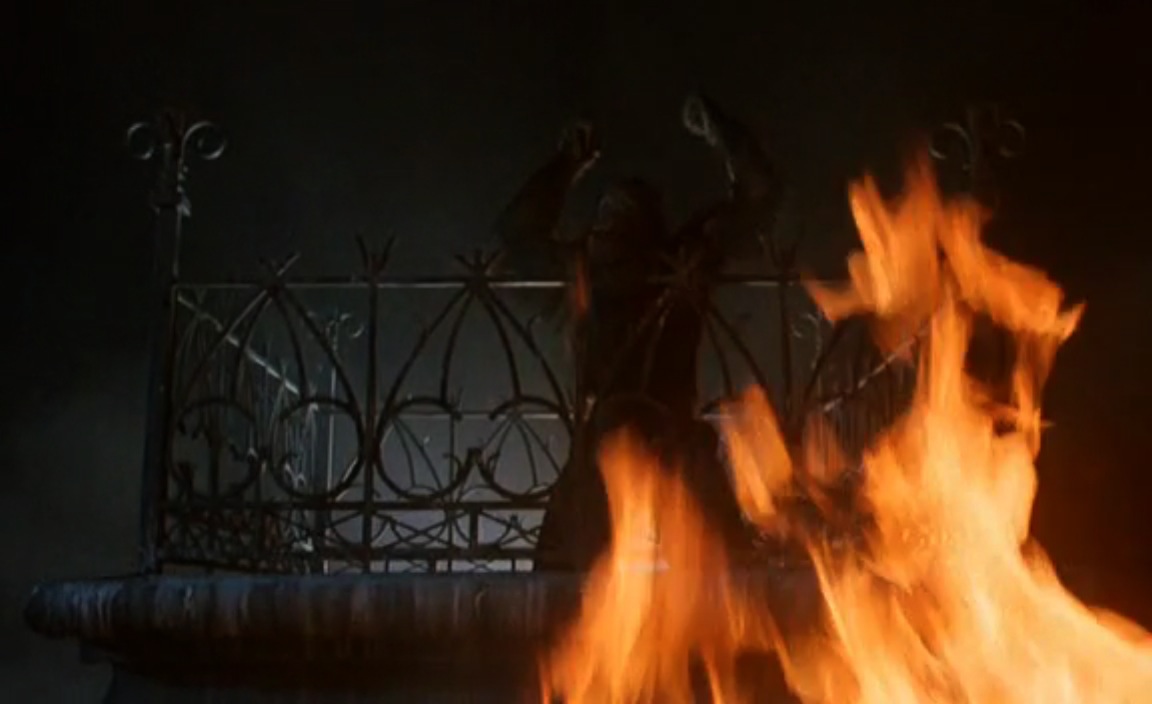B-Movie Bullsh*t
Part Fourteen
Link
(1986)
Synopsis
Jane Chase, a young American woman going to school in England, convinces anthropology professor Dr. Steven Phillip to take her on as his assistant. When she arrives at his country estate, she finds that it is inhabited by three primates. They include an aging female chimp named Voodoo, a young male chimp named Imp, and an old performing orangutan named Link, who dresses in a butler’s outfit, enjoys lighting his own cigars, and is clearly taken in by the new beautiful blonde in his midst. Unbeknownst to Jane, Dr. Phillip is planning on having Link put down, but the intelligent primate figures this out and decides to take some pre-emptive action. He kills the professor and contrives to keep Jane to himself by disconnecting the phone and pushing their only car off a cliff. Unable to get to town by foot because of the local packs of feral dogs, Jane is forced to confront Link as his behaviour grows more and more uncivilized.
Every fan of “bad” movies will eventually have the experience I had when I sat down to watch Link just a few hours ago. I’ve had it more times than I can count, so I should be used to it, but it still surprises me every single time. What I’m talking about is the shock that comes from finding out that the supposedly terrible film you are watching is actually nowhere near as awful as its supposed to be. In this case, Link is pretty damn good if you ignore one obvious, but not fatal flaw.
Ever since I read Leonard Maltin’s “Bomb” rating in his book of capsule reviews years ago I assumed the worst about Link—an assumption that wasn’t dissuaded by the subsequent reviews I read from genre critics who should have been much more open to the material than the notoriously horror-adverse Maltin.
How then to explain the disconnect between the terrible film they reviewed and the enjoyable film I’ve just seen? I think it comes down to one significant factor—Elisabeth Shue.
I say this because Shue is one of those actresses whose appeal does not seem to cross over generational divides. To Baby Boomers no Oscar nomination will ever eclipse the fact that she shall always be the young frivolous blond cipher who starred in Adventures in Babysitting, while to folks my age (Generation X represent!) no Oscar nomination will ever eclipse the fact that she shall always be the hot, gorgeous awesome blond who made us feel funny in our pants when she starred in Adventures in Babysitting.
Link pre-dates her most famous starring role, but my inherent affection for her allowed me to sympathize with her character to a far larger degree than L.A. Morse, for example, who suggested in a short review from his classic Video Trash & Treasures that her performance is easily outshined by that of her orangutan co-star. (In the same review Morse also accuses the film of mistakenly referring to Link as being a chimp, but if any 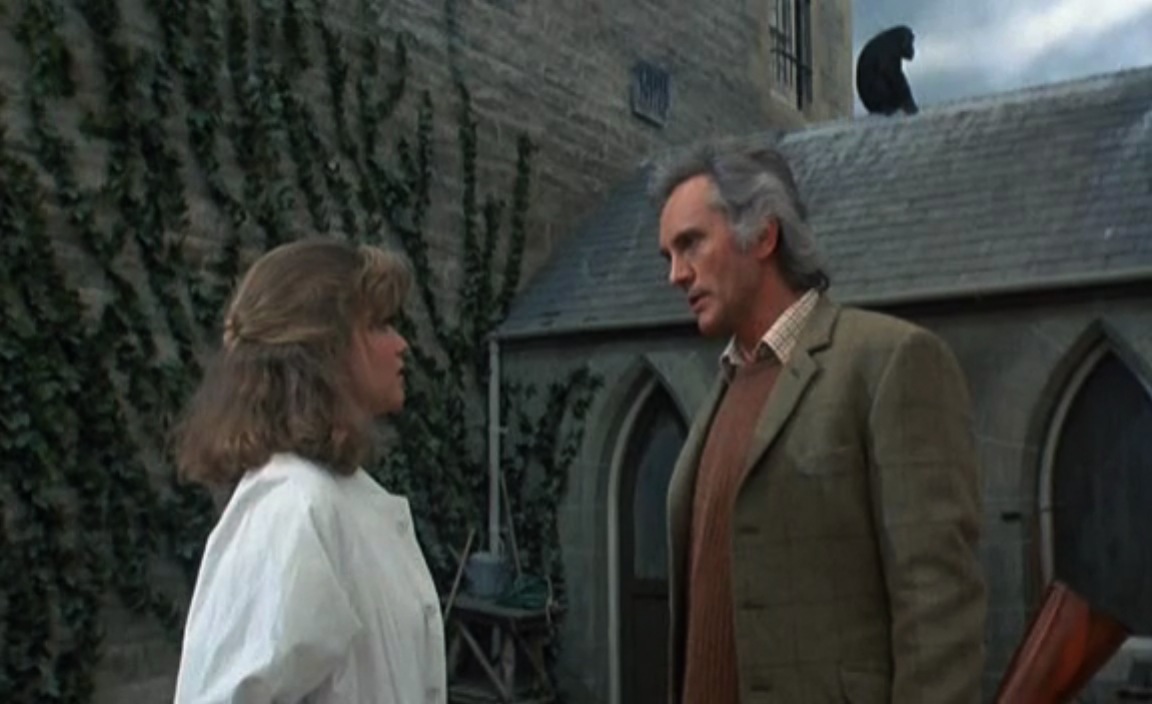 such reference in the film actually occurs, I missed it).
such reference in the film actually occurs, I missed it).
Morse also accuses the film of merely replicating the standard hot-girl-threatened-by-a-maniac premise rather than transcending it, which is another explanation why I enjoyed the film far more than its past critics. I’m perfectly happy watching the ritual of horror clichés followed with religious fervor, so long as the results are entertaining.
Another major factor for my appreciation of Link is one I touched upon in my review of Sssssss from a few weeks ago. Horror movies about animals are only ever as creepy as our own personal distaste for the animals they feature allow. In my case, I am genuinely unnerved by primates. Whenever I see one in a scene with a human actor I feel genuine tension, not because of what is happening onscreen, but because I know that if that “adorable” animal suddenly wanted to, it could seriously injure it’s co-stars in a matter of seconds. This terrifying reality is perfectly expressed in an anecdote the professor shares with Jane during dinner:
Part of Link‘s overall theme is how easy it is to forget how truly unpredictable and fiercely dangerous primates are, simply because of how much they remind us of ourselves. But once you know the truth—like the fact that their adorable “smiles” are actually fear grimaces whose bared teeth are meant to frighten you away rather than indicate you should go in for a hug—its hard to see the cuteness. (I especially love the film’s ending, in which Jane and her injured boyfriend drive away from the burned out husk of an estate and drive by baby chimp, Imp, along the way. Jane’s boyfriend understandably doesn’t want the animal 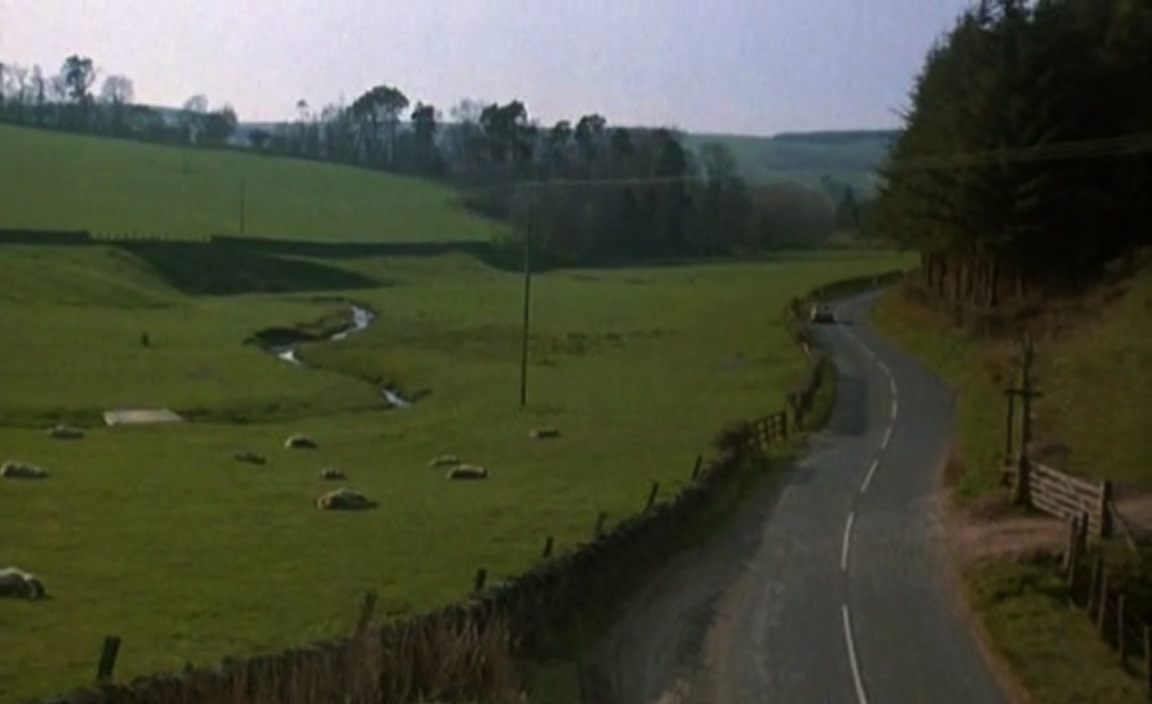 anywhere near him after what he’s just been though, but Jane insists that, “He’s just a baby,” and therefore completely safe. Her delusion is made evident as the camera films the car driving away and reveals a field filled with freshly slaughtered sheep.)
anywhere near him after what he’s just been though, but Jane insists that, “He’s just a baby,” and therefore completely safe. Her delusion is made evident as the camera films the car driving away and reveals a field filled with freshly slaughtered sheep.)
Link worked as well as it did for me because its whole premise is built upon upending the likes of Every Which Way But Loose and Going Ape! or any other film based on presenting apes as just another pet. It helps that it was directed by Richard Franklin, the late Australian Hitchcock acolyte who previously collaborated with screenwriter Everett De Roche on the Ozploitation classics Patrick and Road Games. Watching the film today, much of the fun comes from Franklin’s inventive camera moves and clever shots, which do make you think about what his mentor might have done with similarly loopy material. (It's probably not a coincidence that my favourite scene in the film is the one where Link creeps Jane out by taking off his suit and staring at her while she attempts to have a bath--its overtly sexual overtones are so perverse its clear Hitchcock would have loved it.)
That said, there is a major aspect of Link that does keep it from being better than it is, and that’s Jerry Goldsmith’s terrible score. While it makes sense to play on the comic cuteness of the apes early on in the picture, Goldsmith refuses to drop the comic motif once the cuteness is revealed to be a façade. Rather than give us the kind of classic horror score these scenes deserve, he instead gives us something better suited for the likes of Tim Burton’s Beetlejuice or a comic mystery like Jonathan Lynn’s Clue. Were I not more invested in the film, I could easily see myself being taken out of it for this reason.
I suspect I might be overselling the film, since mine is so clearly the minority view, but Link is nowhere near the disaster its reputation suggests it is. Replace the orangutan with a human assailant and I believe it would still make for an entertaining 100 minutes. The fact that it’s got an ape in a butler suit instead just makes it that much better.
